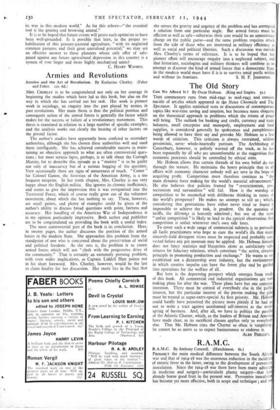Armies and Revolutions
Armies and the Art of Reyolution. By Katharine Chorley. (Faber and Faber. 125. 6d.) MRS. CHORLEY is to be congratulated not only on her courage in beginning the studies which have led to this book, but also on the way in which she. has carried out her task. Her work is pioneer work in sociology, an enquiry into the part played by armies in past revolutions. Her main thesis is that the political position and consequent action of the armed forces is generally the factor which makes for the success or failure of a revolutionary movement. This thesis is examined in relation to a large number of specific examples, and the analysis works out clearly the bearing of other factors on the pivotal factor.
The author's studies have apparently been confiaed to secondary authorities, although she has chosen these authorities well and used them intelligently. She has achieved considerable success in main- taining an objective approach to what are often controversial ques- tions; her most serious lapse, perhaps, is to talk about the Curragh Mutiny, for to describe this episode as a " mutiny " is to be guilty not only of inaccuracy but of a serious begging of the question. Very occasionally there are signs of unsureness of touch. " Canoe " for Colonel Ganoe, the historian of the American Army, is a too frequent misprint. In her tenth chapter, Mrs. Chorley is not very happy about the English militia. She ignores its chronic inefficiency, and seems to give the impression that it was reorganised into the Territorial Force, which of course really grew out of the volunteer movement, about which she has nothing to say. These, however, are small points, and plenty of examples could be given of the author's ability to discuss broad questions with point, fairness and . accuracy. Her handling of the American War of Independence is in my opinion particularly impressive._ Both author and publisher are to be congratulated on providing the book with a useful index.
The most controversial part of the book is its conclusion. Here, in twenty pages, the author discusses the position of the armed forces in the Modern State. She approaches this problem from the standpoint of one who is concerned about the preservation of social and political freedom. As she sees it, the problem is to create armed forces which will not "clash with the progressive drive of the community." -That is certainly an extremely pressing problem, with even wider implications, as Captain Liddell Hart points out in his short foreword„ Mrs. Chorley, however, would be the last to claim finality for her discussion. Her merit lies in the fact that
she senses the gravity and urgency of the problem and has attempted a solution from one particular angle. But armed forces must be efficient as well as safe—otherwise their cost would be an unnecessary charge on the public purse—and the same problem requites attack from the side of those who are interested in military efficiency as well as social and political liberties. Such a discussion was outside Mrs. Chorley's terms of reference. It is to be hoped that her pioneer effort will encourage enquiry into a neglected subject, and that historians, sociologists and military thinkers will combine in an attempt to discover the kind of armed forces that a democratic State in the modern world must have if it is to survive amid perils* within


























 Previous page
Previous page